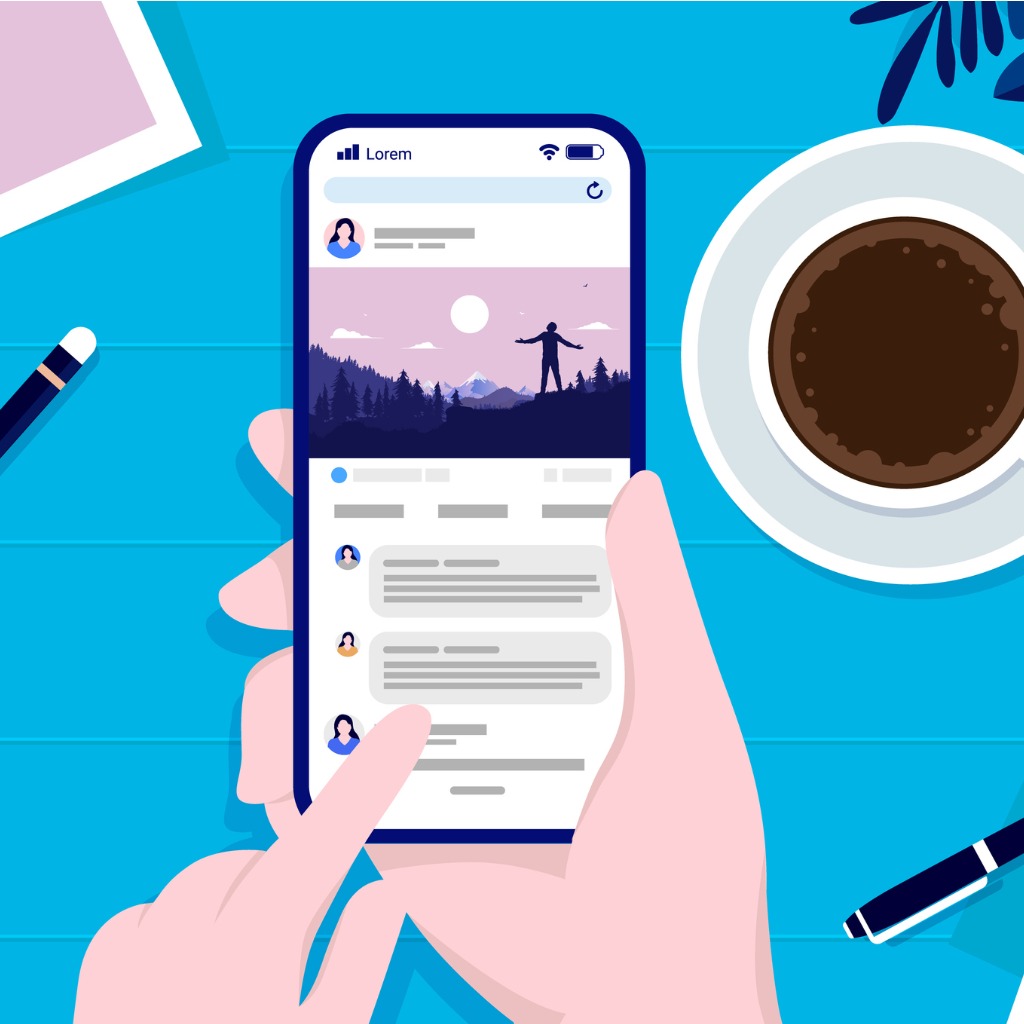Navigating Social Media During Addiction Recovery

Published: February 20, 2025
Social media can be both a lifeline and a landmine during addiction recovery. On one hand, it offers connection, support, and inspiration. On the other, it can expose you to substance-related content, old triggers, and even unconscious habits that may jeopardize your progress.
When you’re in recovery, navigating social media isn’t just about limiting screen time; it’s about protecting your mental space.
The Double-edged Sword of Social Media in Recovery
Social media is deeply woven into everyday life. It’s where we share milestones, keep up with friends, and explore new interests. But for someone in recovery, it can also be a source of stress, comparison, and — most importantly — triggers.
How Social Media Can Impact Recovery
- Exposure to Triggers: Social media feeds often include alcohol- or drug-related posts, from a friend’s night out to influencers promoting substances. These seemingly harmless posts can stir up cravings or memories tied to substance use.
- The Algorithm Effect: Social platforms track your engagement patterns. If you interacted with posts related to partying, alcohol, or drug use before starting recovery, the algorithm may continue to push similar content your way. It’s not malicious — it’s just the app doing its job — but it can unintentionally surface old triggers.
- Social Comparison: Recovery is hard work, and social media’s highlight reels can make it seem like everyone else has it all figured out. Constantly seeing curated snapshots of other people’s lives can stir feelings of inadequacy, loneliness, or self-doubt — all emotional triggers for relapse.
- FOMO (Fear of Missing Out): Watching friends at parties or social events can create a sense of exclusion or regret, especially in early recovery when you’re still adjusting to a new way of life.
Understanding Social Media Algorithms and Triggers
One of the biggest hidden challenges of social media is how algorithms shape what you see. The more you engage with certain types of content — whether it’s videos, hashtags, or specific influencers — the more similar content the app will show you.
Why This Matters in Recovery:
- If you previously liked or saved content featuring parties, drinking, or drug use, your feed may still prioritize similar posts.
- Even passive engagement (like lingering on a post while scrolling) sends signals to the algorithm about what you’re interested in.
This means you could be unintentionally exposing yourself to content that triggers cravings or old thought patterns. But here’s the good news — you can retrain the algorithm.

Tips for Navigating Social Media Safely During Recovery
1. Curate Your Feed Intentionally
- Unfollow or mute accounts that post substance-related content or anything that makes you feel triggered or uneasy.
- Follow recovery-positive accounts, mental health advocates, and communities focused on sobriety and wellness.
- Engage with positive content. The more you like and save recovery-supportive posts, the more the algorithm will surface them.
2. Use Social Media Mindfully
- Set time limits on your social apps to reduce mindless scrolling. Many phones have built-in screen time features that can help.
- Check in with yourself before and after using social media. Are you feeling calm and connected? Or anxious and triggered? Adjust your usage accordingly.
- Avoid doomscrolling. If you notice you’re spiraling into negative content or feeling overwhelmed, step away.
3. Recognize Hidden Triggers
- Be aware of subtle triggers. Even posts that aren’t directly about substance use can be triggering. A “harmless” video of people drinking at a wedding or a post romanticizing late-night parties can stir cravings or nostalgia for your past life.
- Pay attention to emotional triggers like loneliness, boredom, or frustration that can sneak up during passive scrolling.
4. Join Recovery-focused Communities
- Online support groups on platforms like Facebook or Reddit can offer connection, encouragement, and real stories from people walking similar paths.
- Follow accounts that uplift your recovery. Whether it’s sober influencers, mental health professionals, or wellness coaches, surrounding yourself with positive content can be a game-changer.
5. Don’t Be Afraid to Take a Break
If you notice social media is negatively affecting your mood or triggering cravings, step away for a bit. A social media detox — even for a few days — can help clear your head and refocus your energy on your recovery.
Social Media Isn’t Inherently Bad. It’s About How You Use It.
The goal isn’t to avoid social media altogether. It’s about being aware of how it affects you and setting boundaries that protect your recovery. When used mindfully, social platforms can be a source of inspiration, education, and community. But when left unchecked, they can quietly reintroduce old triggers and undermine your progress.
Remember, you’re in control. You can choose what content you engage with, who you follow, and how much time you spend online.
Rockland Treatment Center Can Help You Build Healthy Habits
At Rockland Treatment Center, we understand that recovery isn’t just about quitting substances — it’s about reshaping your life, including your digital habits. Our addiction treatment programs focus on helping individuals identify triggers (both online and offline) and develop healthy coping strategies.
Whether you’re in early recovery or further along in your journey, we can help you navigate challenges like social media use, manage triggers, and build a support system that truly lifts you up.
If you or someone you love is struggling with addiction or navigating recovery, reach out today. We’re here to help you take the next step forward.
